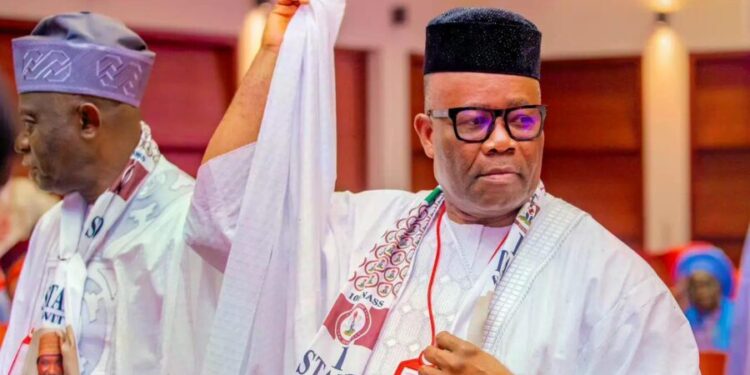Senate President Godswill Akpabio announced that over 30,000 Nigerian students have been selected to benefit from the student loan scheme introduced by President Bola Tinubu. Akpabio made this statement on Tuesday during his visit to the Nigeria Institute of Legislative and Democratic Studies in Abuja.
Highlighting the significance of the Student Loan Bill, Akpabio emphasized its role in allowing underprivileged children to pursue higher education without financial burdens. “One of the most important bills for the tenth Assembly was the bill sent to us by President Bola Tinubu. The Student Loan Bill enables vulnerable Nigerian students, the less privileged, to obtain higher education. And as I speak to you now, over 30,000 Nigerian students have already been selected to benefit from that scheme. That is one of the bills I will say appeals to me the most,” Akpabio said.
Revisiting the National Anthem
Akpabio also reflected on the country’s old-new national anthem, “Nigeria, We Hail Thee,” suggesting that its message could have helped prevent social issues like banditry. Both the House and the Senate recently passed a bill to revert to this anthem, which was abolished in 1978, and President Tinubu signed the bill in May.
“The other impactful bill signed by the National Assembly is reverting to our old national anthem. A lot of people are not aware that there was a panel set up and made up of Nigerians to receive input from all over the world in 1959. So when people are saying we’re bringing in a colonial anthem, they need to look into the history of ‘Nigeria, we hail thee’. If we had kept to that anthem, we probably would not have banditry today in Nigeria because if you take your neighbor as your brother, you will not want to kill him,” Akpabio added.
Key Points on the Student Loan Scheme
The revised Student Loan Act of 2024 was established to eliminate financial barriers and make education more accessible to all Nigerian students, regardless of their economic background. The primary sources of funding for the Nigerian Education Loan Fund (NELFUND) include:
- A percentage of taxes, levies, and duties collected by the Federal Inland Revenue Service (FIRS), Nigerian Immigration Service, and Nigerian Customs Service, amounting to 1% of their total revenues.
- Contributions from profits generated by the government’s natural resource exploitation.
- Education bonds, endowment fund schemes, and donations from individuals and organizations.
The loans cover tuition, fees, and maintenance costs. Repayment begins two years after the beneficiary completes the National Youth Service Corps (NYSC) program.
This initiative marks a significant step towards improving the accessibility and quality of higher education in Nigeria, aligning with global educational standards and promoting social mobility.

